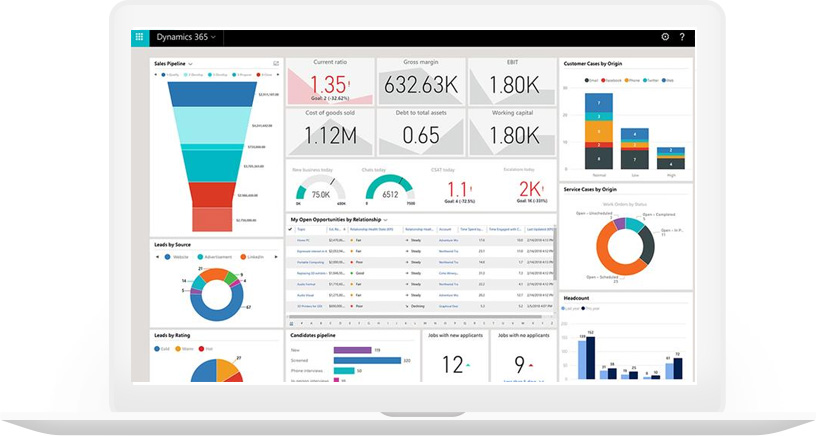
Microsoft Customer Relationship Management (CRM) is a powerful tool that can significantly enhance your sales processes and drive business growth. By centralizing customer data, automating sales tasks, and providing valuable insights, Microsoft CRM empowers sales teams to be more efficient, productive, and customer-focused. In this blog post, we’ll explore 10 ways Microsoft CRM boosts sales for your business and helps you achieve your sales objectives.
- Centralized Customer Data Management
Microsoft CRM allows you to consolidate all customer data into a single, centralized platform. This includes contact information, communication history, purchase history, and interactions with your business across various channels. With easy access to comprehensive customer profiles, sales teams can better understand customer needs, preferences, and behaviors, enabling more personalized and targeted sales efforts.
- Improved Lead Management
Microsoft CRM streamlines lead management processes by providing tools for lead capture, tracking, and qualification. Leads generated from marketing campaigns or other sources can be automatically routed to the appropriate sales representatives based on predefined criteria. With clear visibility into lead status and progress, sales teams can prioritize leads effectively and focus their efforts on high-potential opportunities.
- Enhanced Sales Pipeline Visibility
Microsoft CRM offers real-time visibility into the sales pipeline, allowing sales managers to monitor progress, identify bottlenecks, and forecast sales more accurately. With customizable dashboards and reports, sales teams can track key metrics such as sales revenue, conversion rates, and sales cycle length. This visibility enables proactive decision-making and helps sales teams stay on track to meet their targets.
- Automation of Sales Processes
Microsoft CRM automates repetitive sales tasks, such as data entry, lead assignment, follow-up reminders, and email communications. By automating these tasks, sales teams can save time, reduce manual errors, and focus on more value-added activities, such as building relationships with customers and closing deals. Automation also ensures consistency and efficiency across the sales process.
- Targeted Marketing Campaigns
Microsoft CRM integrates seamlessly with marketing automation tools, allowing you to create targeted marketing campaigns based on customer data and insights. By leveraging CRM data to segment customers, personalize messaging, and track campaign performance, you can improve the effectiveness of your marketing efforts and generate higher-quality leads for your sales team.
- Improved Customer Engagement
Microsoft CRM enables sales teams to engage with customers more effectively across multiple channels, including email, phone, social media, and in-person interactions. By tracking customer interactions and preferences in the CRM system, sales representatives can deliver personalized and timely communications that resonate with customers, fostering stronger relationships and increasing customer loyalty.
- Collaboration and Knowledge Sharing
Microsoft CRM facilitates collaboration and knowledge sharing among sales teams by providing a centralized platform for sharing information, insights, and best practices. Sales representatives can collaborate on deals, share valuable sales collateral, and learn from each other’s experiences, improving overall team performance and productivity.
- Sales Forecasting and Planning
Microsoft CRM provides powerful forecasting tools that enable sales managers to predict future sales trends, identify potential opportunities and risks, and allocate resources effectively. By analyzing historical sales data and pipeline metrics, sales teams can create more accurate sales forecasts and develop strategic sales plans to achieve their targets.
- Integration with Microsoft ERP
Integration between Microsoft CRM and Microsoft Enterprise Resource Planning (ERP) systems enables seamless data exchange between sales and other business functions, such as finance, inventory management, and order processing. This integration provides a holistic view of customer interactions and transactions, enabling more informed decision-making and enhancing overall business efficiency.
- Continuous Improvement through Analytics
Microsoft CRM offers robust analytics and reporting capabilities that enable sales teams to track performance, identify trends, and uncover insights for continuous improvement. By analyzing sales data, customer feedback, and market trends, sales teams can identify areas for optimization, refine their sales strategies, and drive better business results over time.
In conclusion, Microsoft CRM offers a comprehensive suite of features and capabilities that can significantly boost sales for your business. From centralized customer data management to automation of sales processes, targeted marketing campaigns, improved customer engagement, and collaboration among sales teams, Microsoft CRM empowers sales teams to achieve their goals and drive business growth. By leveraging the power of Microsoft CRM, your business can enhance sales efficiency, increase revenue, and build stronger relationships with customers.


